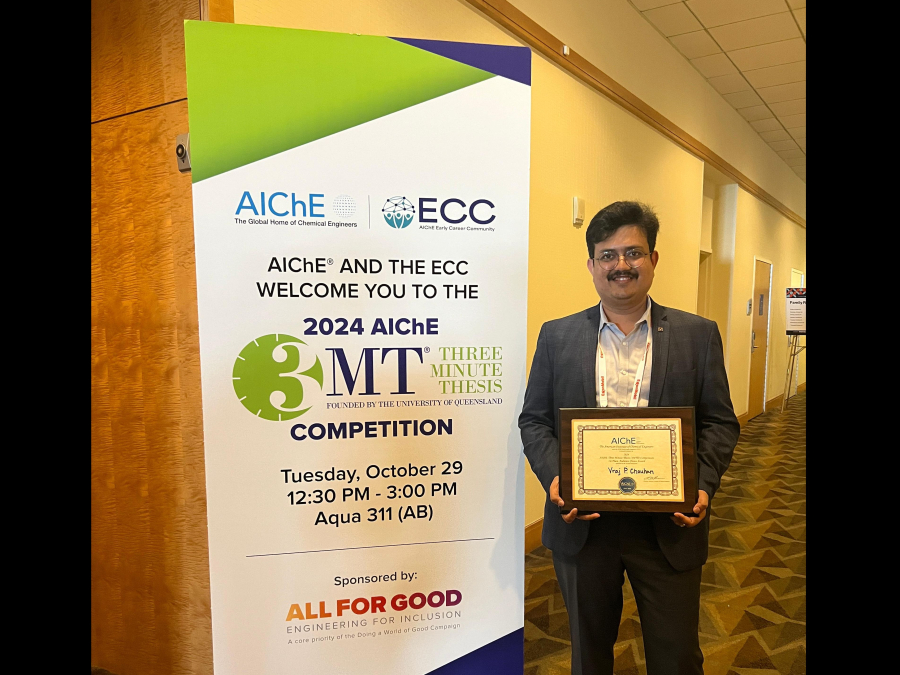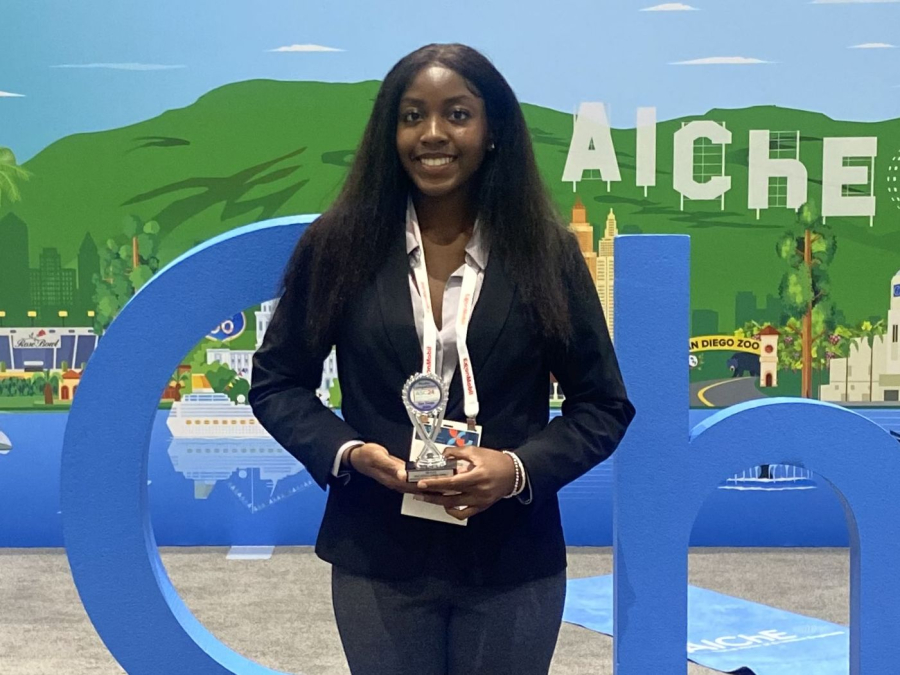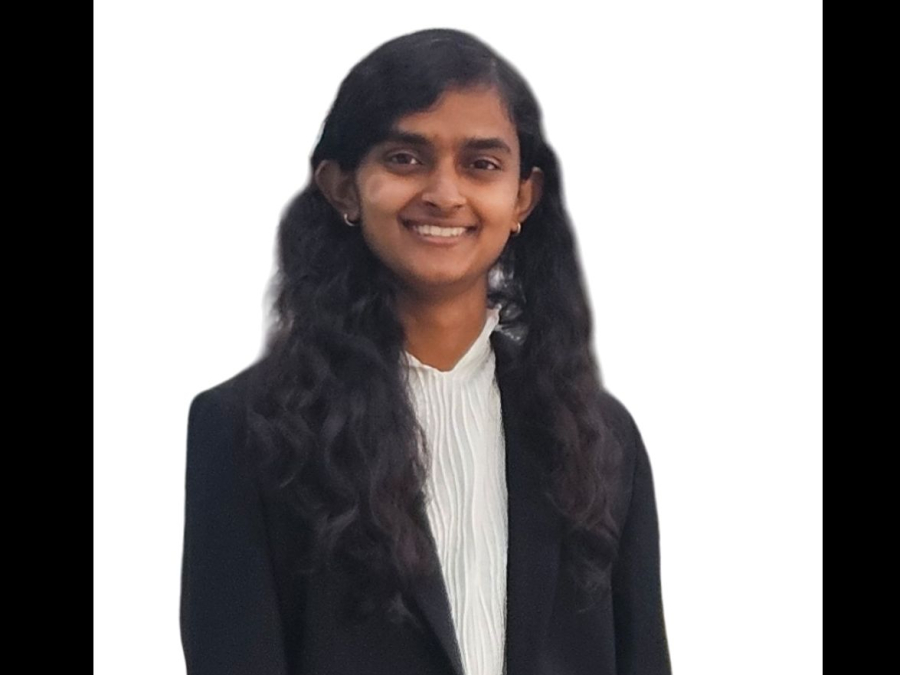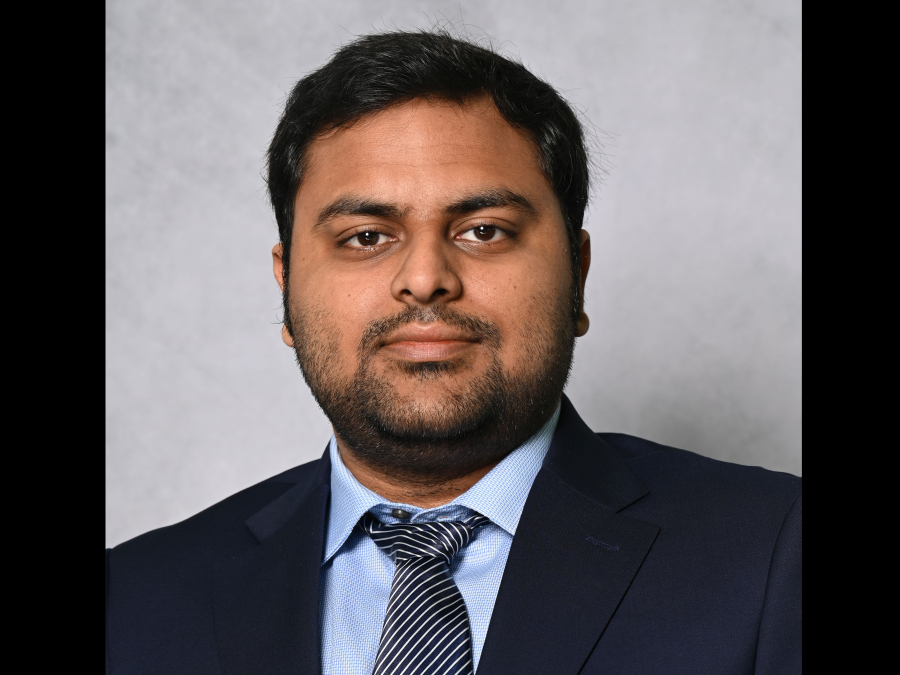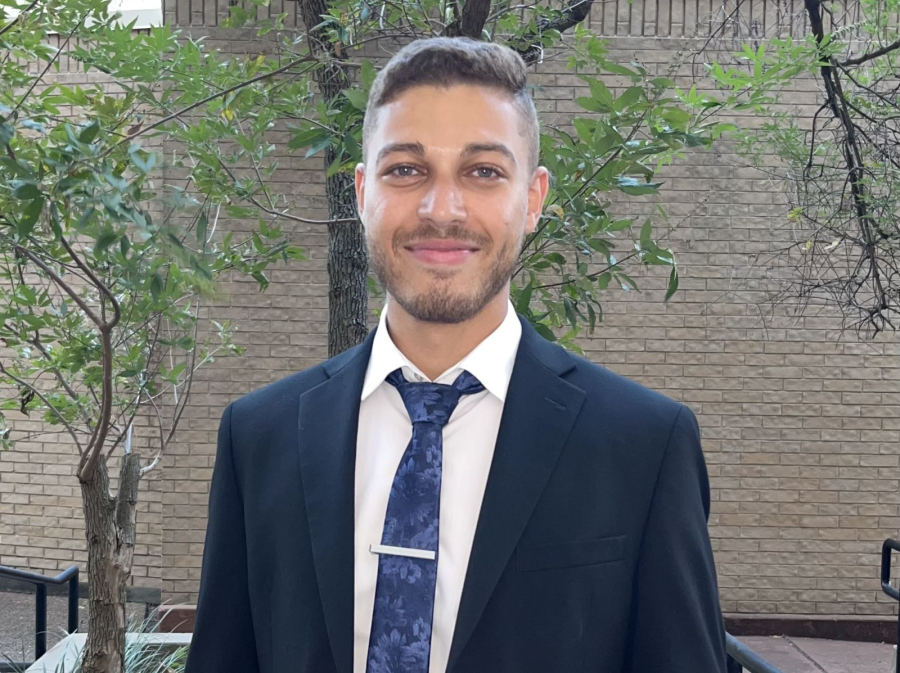Cullen College of Engineering students once again excelled at a national conference, as six different members of the William A. Brookshire Department of Chemical and Biomolecular Engineering earned awards at the 2024 annual meeting of the American Institute of Chemical Engineers (AIChE) in late October.
With more than 60,000 members in more than 110 countries, the AIChE is the premier professional organization for chemical engineers. The annual meeting allows for researchers from across the globe to network and share their work with one another.
The six Cullen students honored were:
Kumari Shilpa, advised by Jeffrey Rimer, Abraham E. Dukler Professor. Shilpa earned a first place poster award for her work, “Enhancing Zeolite Catalyst Performance By Novel Secondary Growth and Post-Treatment Methods.”
“My research focuses on controlling intrinsic defects and enhancing mass-transport of zeolites by secondary treatment methods,” she said. “The latest findings show that molecular diffusion in one-dimensional porous zeolites is faster after secondary hydrothermal treatment, resulting in reduced rates of coking and longer catalyst lifetime relative to conventional counterparts.
Cheery Chukwukelu, advised by Jerrod Henderson, assistant professor in the ChBE Department, earned third place honors in the Education Division for her poster, “Exploring Cultural Capital Among Black Engineering Students at Minority-Serving Institutions.”
Her work examines student success, with a particular focus on Black students in engineering.
“We draw and build upon the work of researchers who highlight how engineering students possess cultural wealth that allows them to succeed in engineering. Using community cultural wealth (CCW) as a theoretical framework, we explored how five Black engineering undergraduate students at Historically Black Colleges & Universities and Hispanic Serving Institutions cultivated and used their cultural capital,” she said.
“We used a qualitative approach that included semi-structured interviews. The six forms of cultural capital (linguistic, resistant, familial, social, aspirational, and navigational) served as a priori codes for deductive analysis. We developed two themes that describe how students built, supported and used their cultural capital, which included Relationships as the Bedrock for Success and Intersections of Cultural Capital in Overcoming Challenges.”
“Our research findings revealed that familial and social relationships are crucial for early STEM engagement, emotional support, building aspirations, and developing needed skills for navigating engineering. Black engineering students were also sources of cultural capital for their peers, reinforcing their cultural wealth.”
This suggests the need for environments and spaces that cultivate and make space for community building and a sense of belonging support, Chukwukelu added.
About receiving the award itself, Chukwukelu said, “Engineering education is an important and rapidly growing field, and I am honored to have received recognition for my research contributions in this area! I would not have been able to conduct this research without the help of the Henderson Research Group, especially my advisor, Dr. Henderson.”
Amir Abutalib, advised by Rimer, earned a third place graduate student award for his research, “Tuning the Acidity of Zeolite Catalysts for Efficient Alcohol-to-Olefin Conversion.”
“This work highlights the transformative potential of introducing less acidic heteroatoms into zeolites – a strategy often underestimated in catalysis,” he said. “By precisely engineering heteroatoms to create tailored acid site strengths, we can unlock new catalytic capabilities for a wide range of tandem reactions, paving the way for more versatile and efficient catalytic solutions.”
Abutalib added, “It was a wonderful experience not only attending AIChE for the first time but showcasing my work in the Inorganic Materials Graduate Student Award session among some very talented speakers. The support of my colleagues, friends and advisors is truly what makes all of this possible.”
Vraj Chauhan, advised by Rimer, won the Audience Choice Award in the Three-Minute Thesis (3MT) Competition for “Crystal Clear: The Science of Kidney Stone Dissolution.”
“Kidney stone is a common clinical problem affecting 12 to 14 percent of the global population with a high rate of recurrence,” he said. “My research is focused on understanding the dissolution of these highly resistant calcium stones in the presence of molecular modifiers. With knowledge of dissolution at a molecular level, we seek to develop a better understanding of dissolution pathways for future therapeutics.”
He shared his feelings on winning.
“Winning the Audience Choice Award for my 3MT presentation is truly an honor and a thrilling experience,” he said. “Knowing I successfully bridged the gap between technical scientific knowledge and public interest is incredibly rewarding. The award has boosted my confidence in presenting my work and has motivated me to continue exploring innovative ways to share scientific discoveries with both specialists and non-specialists alike.”
Sreyashi Ghosh, advised by Mehmet Orman, associate professor, earned third place in the 3MT Competition, and also a Women in Chemical Engineering Travel Award. Earlier this year, she also earned a PD2M student award.
For the 3MT, Ghosh presented, “Drug-resistant superbugs: Can we stop them?” The travel award was for her research “Exploring The Interlinks Between SOS Response, Mutagenesis, and Resistance During the Recovery Period.”
“Antibiotic resistance arises when bacteria evolve to withstand antibiotics, creating dangerous superbugs. This escalating issue could lead to 10 million deaths annually by 2050,” she said. “The root cause lies in bacterial mutations that occur when antibiotics damage their DNA, and the bacteria repair it imperfectly, leading to resistance.”
“My research delves into these extremely convoluted DNA repair pathways that drive bacterial mutagenesis and thus antibiotic resistance. Additionally, I am exploring potential alternative therapeutic strategies, based on experimental insights, to combat antibiotic resistance and prevent a future pandemic caused by these deadly superbugs.”
Ghosh said she was appreciative of having her efforts recognized.
“Making science easily accessible and understandable to all is something I am deeply passionate about, and I wholeheartedly thank the organizers of these two awards — the Early Career Community and the Women in Chemical Engineering — for providing me with this platform to nurture my passion. The Three-Minute Thesis competition challenges me to simplify complex ideas for non-specialist audiences using simple, clear language, while WIC empowers women in STEM through mentorship and networking. As an active member of these communities, I am committed to advancing their missions, inspiring others, and contributing to the broader impact of science and inclusivity.”
Dipayan Chakraborty, advised by Rimer, won the Separations Division Graduate Student Research Award. His research was on “Understanding Cholesterol Crystallization Mechanisms.” Earlier this year, he also earned a PD2M student award and a student research award.
“Cholesterol plays an essential role in human physiology but is also a key component of pathological diseases like heart plaque (atherosclerosis) and gallstones,” he said. “Despite its relevance to worldwide healthcare problems, few studies have examined fundamental mechanisms of cholesterol crystallization. Mechanistic understanding would lead to innovation of drugs that would eliminate the need for surgical procedures by inhibiting the crystallization process, as current drugs affect the blood cholesterol levels not the crystallized one.”
When asked how he felt about receiving this award, Chakraborty said, “It’s a great feeling to be recognized with two prestigious awards! A heartfelt thank you to PD2M division and AIChE for the recognition. Also, a big thank you to the Separation Division for the Graduate Student Research Award. I’m also incredibly grateful to my advisor, Dr. Rimer, for his unwavering guidance and encouragement. I want to extend my gratitude to my mother and elder sister for being always there for me and being my support system. These recognitions means so much, and I look forward to continuing to contribute to the field!”
![Sreyashi Ghosh [right] with her advisor Mehmet Orman [left]. Sreyashi Ghosh [right] with her advisor Mehmet Orman [left].](/sites/ccoe.egr.uh.edu/files/images/news/2025/sreyashi-ghosh-01-crop.jpg)
